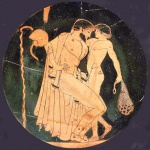Template:News/Art and Entertainment/Books and reviews: Difference between revisions
From BoyWiki
No edit summary |
No edit summary |
||
| Line 7: | Line 7: | ||
*[[Review of Reasons of the Heart]] | *[[Review of Reasons of the Heart]] | ||
::Out of the blue and after ten years of no communication, Australian teacher Fred Musgrove receives a telephone call from recently widowed, young Jonno, his lost love. <br>(Book Review, [[Alexander's Choice (book)|Edmund Marlowe]], August 28, 2016 )<!-- Added 8-28-16 --> | ::Out of the blue and after ten years of no communication, Australian teacher Fred Musgrove receives a telephone call from recently widowed, young Jonno, his lost love. <br>(Book Review, [[Alexander's Choice (book)|Edmund Marlowe]], August 28, 2016 )<!-- Added 8-28-16 --> | ||
*[[Review of Full Service by Scotty Bowers]] | |||
::Scotty Bowers was a Hollywood petrol-pump attendant and later bartender, but these occupations were easily eclipsed by his role in the sex lives of the film stars and other major celebrities who frequented his adopted town.<br>([[Alexander's Choice (book)|Edmund Marlowe]], October 17, 2016 )<!-- Added 10-17-16 --> | |||
*[[Review of Enchanted Youth]] | *[[Review of Enchanted Youth]] | ||
| Line 19: | Line 22: | ||
*[[Review of Oscar Browning: A Biography by Ian Anstruther]]<br>(Book Review, [[Alexander's Choice (book)|Edmund Marlowe]], February 1, 2016) | *[[Review of Oscar Browning: A Biography by Ian Anstruther]]<br>(Book Review, [[Alexander's Choice (book)|Edmund Marlowe]], February 1, 2016) | ||
::Oscar Browning (1837-1923), Eton schoolmaster and Cambridge don, widely known as O.B., was an unusually colourful character even by the high standards of eccentricity often found in these ancient institutions. | ::Oscar Browning (1837-1923), Eton schoolmaster and Cambridge don, widely known as O.B., was an unusually colourful character even by the high standards of eccentricity often found in these ancient institutions. | ||
*[[Review of Lunch with Elizabeth David]]<br> (Book Review, [[Alexander's Choice (book)|Edmund Marlowe]] on December 22, 2015) | *[[Review of Lunch with Elizabeth David]]<br> (Book Review, [[Alexander's Choice (book)|Edmund Marlowe]] on December 22, 2015) | ||
Revision as of 11:52, 17 October 2017
Books and reviews
- Out of the blue and after ten years of no communication, Australian teacher Fred Musgrove receives a telephone call from recently widowed, young Jonno, his lost love.
(Book Review, Edmund Marlowe, August 28, 2016 )
- Out of the blue and after ten years of no communication, Australian teacher Fred Musgrove receives a telephone call from recently widowed, young Jonno, his lost love.
- Scotty Bowers was a Hollywood petrol-pump attendant and later bartender, but these occupations were easily eclipsed by his role in the sex lives of the film stars and other major celebrities who frequented his adopted town.
(Edmund Marlowe, October 17, 2016 )
- Scotty Bowers was a Hollywood petrol-pump attendant and later bartender, but these occupations were easily eclipsed by his role in the sex lives of the film stars and other major celebrities who frequented his adopted town.
- The danger and allure of prostitution for boys.
(Book Review, Edmund Marlowe, August 26, 2016 )
- The danger and allure of prostitution for boys.
- Review of Enchanted Boy
(Book Review, Edmund Marlowe, August 6, 2016 )
- This story of a boy's life in Liverpool aged five to fifteen in the years 1948 to 1958 is told with profound humanity.
- Two gay trilogies worth a read
(Book review, Bernie Najarian, March 27, 2016)
- Many same-sex-attracted MAPs these days profess to feel completely separate from the gay community (sorry, LGBT-ETC-but-no-P community), but in reality, writings that are potentially relevant to us get published fairly often by members of that community. The opposite may happen, too – useful stuff published within our community may be out there for those LGBTs who are brave enough to take advantage.
- Review of Oscar Browning: A Biography by Ian Anstruther
(Book Review, Edmund Marlowe, February 1, 2016)
- Oscar Browning (1837-1923), Eton schoolmaster and Cambridge don, widely known as O.B., was an unusually colourful character even by the high standards of eccentricity often found in these ancient institutions.
- Review of Lunch with Elizabeth David
(Book Review, Edmund Marlowe on December 22, 2015)
- This is a review of Lunch with Elizabeth David by Roger Williams (1999), of possible interest to some here as a novel mostly about the boyloving writer Norman Douglas.

- Restored and retold by Andrew Calimach
- The chart that follows presents a global view of the surviving Greek myths centered on paederastic desire. They are grouped by categories named “scenarios,” of which four principal types are identified, “Hybristic erastes;” “Enkratic erastes and collaborative eromenos;” “Imprudent erastes and eromenos;” and “Hybristic eromenos.” Each scenario type is labeled according to the dominant dynamic of the stories in the group.